Originally posted on December 20, 2023 @ 8:16 am
Welcome to our guide on co-op grocery stores! In this article, we will explore what co-op grocery stores are, how they work, and why they matter. If you’ve ever wondered about the benefits of shopping at a community-owned grocery store or are curious about the co-op grocery model, you’ve come to the right place.
A co-operative, or co-op, grocery store is a unique type of grocery store that is owned and operated by members of the community. Unlike corporate chains, co-op grocery stores are independent and focus on serving the needs of their community. They prioritize local sourcing, knowing their farmers and family business owners by name. Co-ops also adhere to a set of co-op principles that guide their business practices. These principles include voluntary and open membership, democratic control, and concern for the community.
Co-op grocery stores are not just places to buy food; they are hubs of community connection and social responsibility. By joining a co-op, you become part of a community that supports local farmers and small businesses, promotes sustainable practices, and fosters a sense of togetherness.
Table of Contents
Key Takeaways:
- Co-op grocery stores are community-owned and operated.
- They prioritize local sourcing and adhere to co-op principles.
- Co-ops foster community connection and social responsibility.
- Joining a co-op supports local farmers and small businesses.
- Shopping at a co-op is an opportunity to actively participate in a system that benefits both individuals and the community.
How Co-ops Work

Co-op grocery stores operate in a unique way, combining the convenience of a traditional grocery store with the benefits of community ownership. At a co-op, anyone can shop, eat, and hang out. However, what sets co-ops apart is the opportunity for individuals to become co-op owners by purchasing ownership shares.
By becoming a co-op owner, you not only gain access to delicious and healthy food but also enjoy a range of benefits. Firstly, you can receive financial rewards such as discounts and coupons, helping you save money on your grocery purchases.
“Being a co-op owner means I get exclusive discounts on my favorite products, which makes it even more affordable to shop at my local co-op!” – Sarah, Co-op Owner
In addition to financial rewards, co-op owners have a voice in the co-op’s operations. This includes having a vote in choosing the board of directors, who help shape the co-op’s future direction. As a co-op owner, you have the opportunity to impact the decisions that affect your community grocery store.
“Joining a co-op gave me the chance to have a say in what products are available and how the store operates. It’s a democratic approach to business that I find empowering.” – Mike, Co-op Owner
It’s important to note that each co-op is unique in its structure and operations. While the core principles of community ownership remain consistent, the specific benefits and responsibilities of co-op ownership can vary from store to store. However, regardless of the individual differences, all co-ops share a common goal: to provide their community with delicious and healthy food options.
Benefits of Co-op Ownership
Here are some key benefits of becoming a co-op owner:
- Financial rewards, such as discounts and coupons
- Voting rights in choosing the board of directors
- The opportunity to impact the co-op’s future direction
- Supporting a locally owned and operated business
- Contributing to a vibrant and sustainable food system
Becoming a co-op owner is a fulfilling way to support your community and make a positive impact on the local food landscape. Through co-op ownership, you can enjoy the benefits of being part of a cooperative business while ensuring that your grocery store aligns with your values.
Next, we’ll explore why co-op grocery stores play such an important role in our communities and how they prioritize cooperation and community development.
The benefits of co-op ownership
| Benefits | Description |
|---|---|
| Financial Rewards | Co-op owners enjoy discounts, coupons, and even a share of the co-op’s profits through patronage dividends. |
| Voting Rights | Co-op owners have a say in the co-op’s operations and can vote for the board of directors, influencing the co-op’s future direction. |
| Community Impact | By becoming a co-op owner, you support a locally owned and operated business, contributing to the vibrancy and sustainability of your community. |
Why Co-Ops Matter
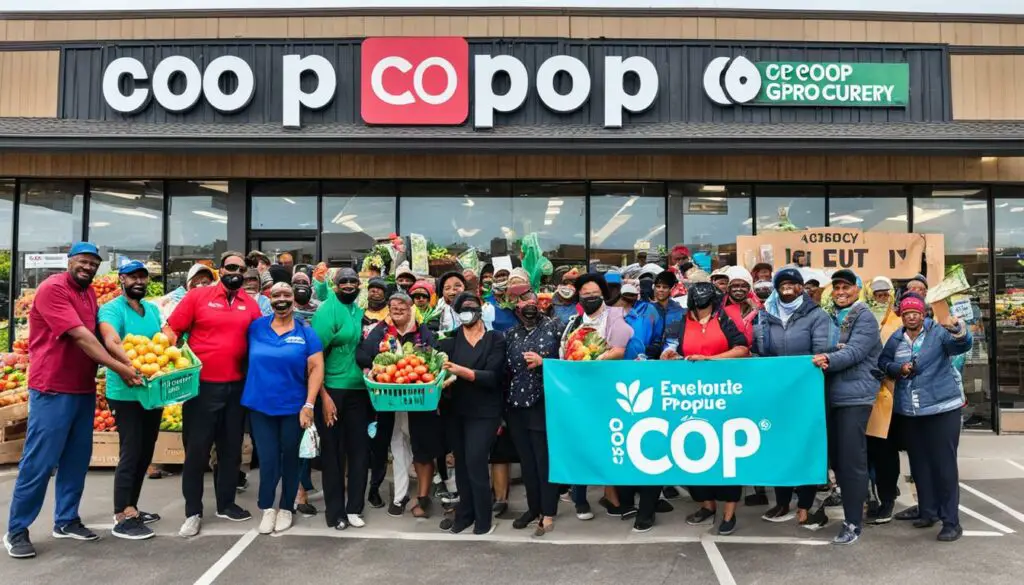
Co-ops matter because they prioritize cooperation and community development. These unique grocery stores provide a means for people to meet their economic, social, and cultural needs while fostering a strong sense of community.
Co-op grocery stores follow a set of principles that guide their business practices, including a commitment to environmental and social responsibility. By prioritizing sustainable practices and local sourcing, co-ops play a vital role in supporting the health of the planet and the well-being of their communities.
One of the key benefits of co-ops is that they keep money in the local economy. By supporting local farmers, producers, and small businesses, co-ops help create a thriving local food system and contribute to the economic development of the community.
Co-ops also increase market access for locally produced food, ensuring that communities have access to fresh, high-quality products. Whether it’s organic produce, grass-fed beef, or specialty products for individuals with dietary restrictions, co-op grocery stores offer a diverse range of options that prioritize the health and well-being of their customers.
Co-Op Principles
- Voluntary and Open Membership: Co-ops are open to all, regardless of race, religion, gender, or socioeconomic background.
- Democratic Member Control: Co-ops operate based on the principle of one member, one vote, ensuring that decisions are made collectively and transparently.
- Member Economic Participation: Members contribute financially to the co-op and share in its financial success through patronage dividends and discounts.
- Autonomy and Independence: Co-ops are independent entities, controlled by their members, and operate in accordance with cooperative principles.
- Education, Training, and Information: Co-ops provide opportunities for education and training to their members, employees, and the community.
- Cooperation Among Cooperatives: Co-ops work together and support each other, fostering a sense of solidarity and collaboration.
- Concern for Community: Co-ops prioritize the well-being of their community and contribute to its sustainable development.
Overall, co-ops are more than just grocery stores; they are community hubs that prioritize cooperation, community development, and sustainable practices. By supporting a co-op grocery store, you are not only getting access to delicious and healthy food, but also actively participating in a system that fosters community and social responsibility.
Benefits of Joining a Co-Op
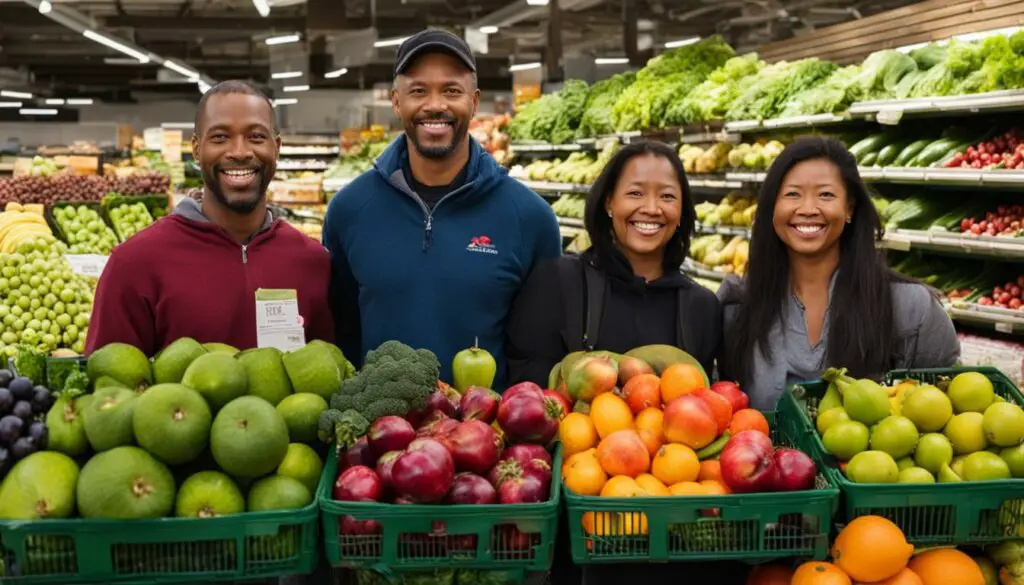
Joining a co-op grocery store comes with several benefits that make it a worthwhile investment for individuals looking for more than just a regular shopping experience. Co-op owners enjoy financial rewards, a democratic approach to business operations, and the satisfaction of supporting the local economy.
One of the key financial rewards of being a co-op owner is the access to discounts and coupons exclusive to members. These discounts can help individuals save money on their grocery bills, making healthy and high-quality food more affordable. Additionally, co-op owners often receive a share of the co-op’s profits through patronage dividends, further enhancing the financial rewards.
Moreover, co-op owners have a democratic voice in the decision-making process of the co-op. They can actively participate in electing the board of directors, who play a crucial role in shaping the co-op’s policies, practices, and long-term strategies. This democratic approach empowers owners and ensures that the co-op aligns with their values and priorities.
By joining a co-op grocery store, individuals contribute to supporting the local economy. Co-ops prioritize sourcing products from local farmers and small businesses, which helps to keep money circulating within the community. This not only strengthens the local economy but also fosters a sense of community pride and connection.
Joining a co-op grocery store offers not only the opportunity to enjoy financial rewards and have a say in the co-op’s operations but also the satisfaction of contributing to a democratic and community-centered business model. It’s a chance to be part of something bigger than just a grocery store and actively participate in supporting the local economy while enjoying delicious and healthy food.
Access to Local and High-Quality Products
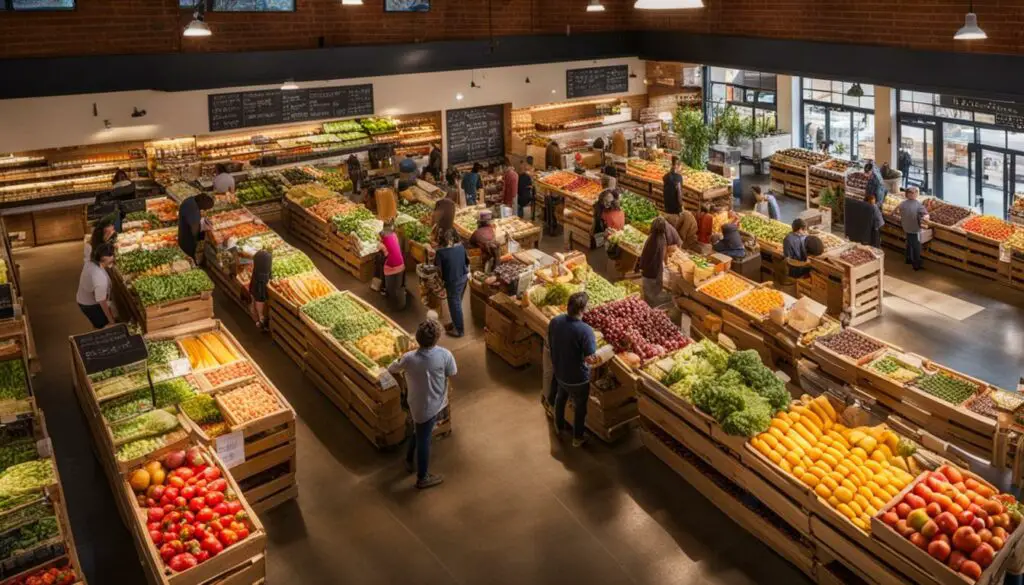
When it comes to co-op grocery stores, one of the standout features is their access to local food and high-quality products. By prioritizing relationships with local farmers and family business owners, co-ops ensure that the food they offer is sourced directly from the community. This not only supports local farmers but also provides customers with fresh, seasonal produce and a connection to the people behind their food.
Supporting Local Farmers
Co-op grocery stores are dedicated to supporting local farmers and fostering a sustainable food system. By forging direct relationships and knowing their farmers personally, co-ops create a sense of trust and accountability. This allows for transparency in the sourcing process and ensures that customers can trace the origins of their food, supporting the local economy and reducing the carbon footprint associated with transportation.
High-Quality Products for All Diets
In addition to offering local food, co-op grocery stores cater to a diverse range of dietary needs. They strive to provide high-quality products that align with various special diets and food sensitivities. Whether you follow an organic lifestyle, adhere to a gluten-free diet, or seek out grass-fed beef, a co-op is an excellent resource. You can confidently find the products that suit your preferences and health requirements without compromising on taste or quality.
“At our co-op, we believe that everyone should have access to fresh, local, and high-quality food. That’s why we work closely with farmers and producers in our community to bring you the best products while supporting their livelihoods.”
By shopping at a co-op grocery store, you not only have the opportunity to support local farmers and businesses but also to discover unique and flavorful food. The commitment to sourcing local and high-quality products ensures that you can experience the freshest ingredients and contribute to a thriving community. So why not visit your local co-op and explore the abundance of local and high-quality products it has to offer?
Supporting Local Farmers and Small Businesses
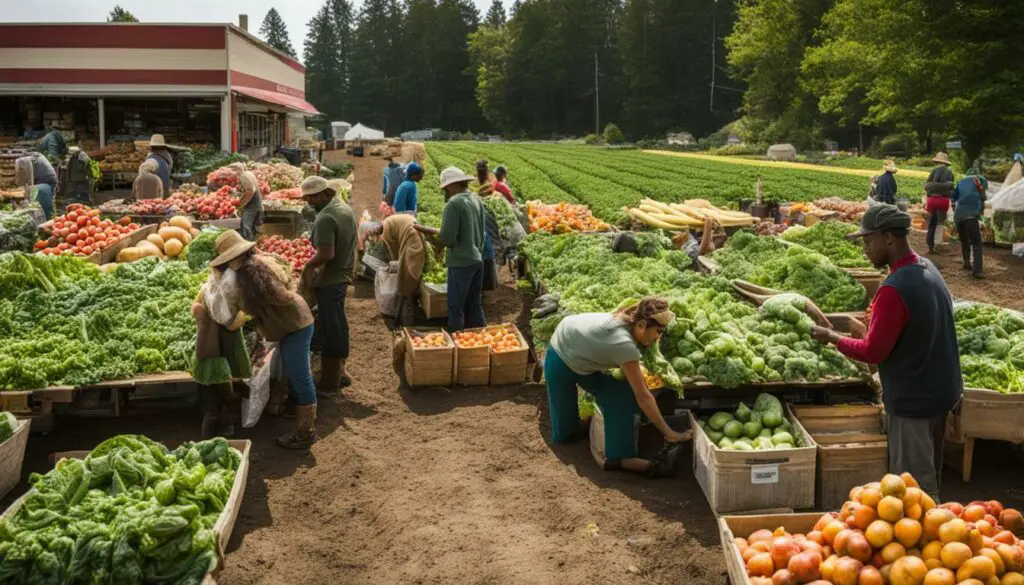
Co-op grocery stores are committed to supporting local farmers and small businesses. They understand the importance of sourcing products from nearby farms and businesses, which not only helps to stimulate the local economy but also ensures the freshest and highest-quality goods for their customers.
By prioritizing local producers, co-ops establish meaningful relationships with farmers, artisans, and family-owned businesses in their communities. They work directly with these local partners to bring their products to the shelves, creating a direct and mutually beneficial partnership.
Why does co-op support matter?
“Supporting local farmers and small businesses is a key aspect of what makes co-op grocery stores so special. It’s not just about providing access to fresh and delicious products; it’s about creating a sustainable local economy.”
– Jane Thompson, Founder of Local Harvest Co-op
When you choose to shop at a co-op grocery store, you are making a conscious decision to support local farmers and small businesses. By doing so, you play a vital role in fostering economic growth and stability in your community.
Here are some key benefits of co-op support for local farmers and small businesses:
- Keeping money in the local economy: By sourcing products locally, co-ops ensure that the money spent on groceries stays within the community, benefiting local farmers and small businesses.
- Preserving farmland: By providing a stable market for local farmers, co-ops help preserve valuable farmland, protecting it from urban development and ensuring its long-term sustainability.
- Promoting sustainable practices: Local farmers often prioritize sustainable and environmentally-friendly farming practices. By supporting them, co-ops incentivize and promote sustainable agriculture within their communities.
- Encouraging diversity and innovation: Co-ops provide a platform for local producers to showcase their unique products and contribute to the vibrant and diverse food culture of the community.
The support provided by co-op grocery stores is a lifeline for many local farmers and small businesses. It allows them to thrive and continue their operations in an increasingly challenging market dominated by large-scale industrial agriculture.
| Type of Support | Benefit |
|---|---|
| Direct sourcing from local farms | Ensures fresh, high-quality produce and products for customers |
| Promotion of local producers | Allows small businesses to gain exposure and build a loyal customer base |
| Market access for small-scale operations | Provides a reliable market for local farmers and artisans, enabling them to sustain their businesses |
| Financial support and stability | Co-op purchases provide a steady income stream for local producers, offering financial security |
Co-op grocery stores play a vital role in connecting consumers with the local food system and strengthening their communities. By supporting co-ops, you contribute to the resilience and success of local farmers and small businesses while enjoying fresh, sustainable, and delicious products.
The Sense of Community
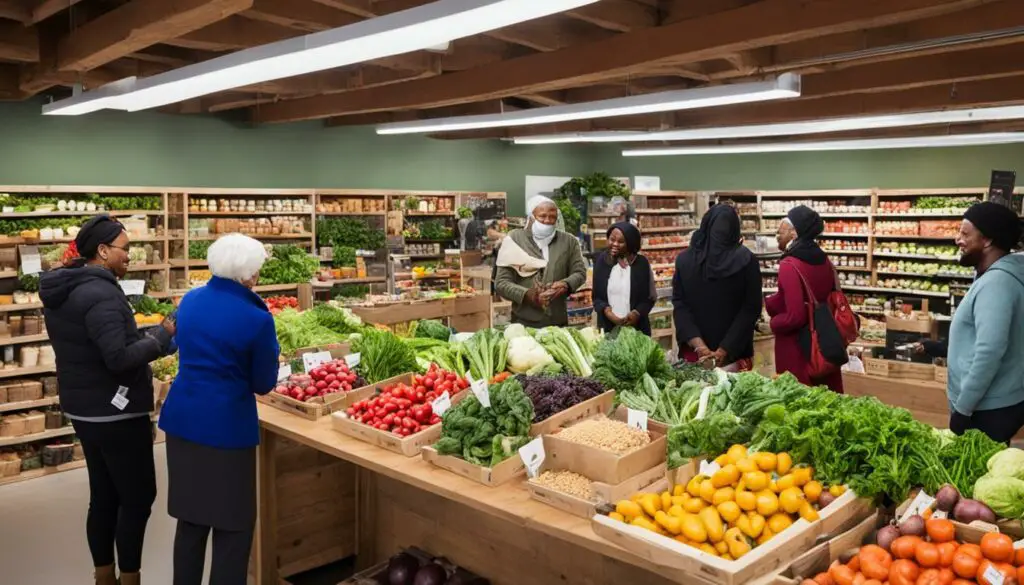
One of the unique aspects of co-op grocery stores is the strong sense of community they foster. By being owned and operated by members of the community, co-ops create a gathering place where people can connect and form relationships.
“Being part of a co-op is like being part of a big family. Everyone is welcoming and supportive, and you really get to know the people behind the products you love. It’s more than just shopping; it’s about building a community.”
When you shop at a co-op grocery store, you become part of something larger than just a commercial exchange. The connections and relationships formed at co-ops extend beyond the aisles. It’s a place where you can chat with fellow shoppers, share recipe ideas, and even participate in community education projects.
Co-ops often host events and workshops that bring the community together. From cooking classes to gardening workshops, these activities provide opportunities for learning, sharing knowledge, and fostering connections among community members.
Forming relationships at co-ops is not just limited to customers; it also extends to the relationships co-ops form with local farmers and small businesses. Co-op grocery stores prioritize sourcing products from local sources, which creates a direct connection between the community and the food producers.
By supporting local farmers and small businesses, co-ops contribute to the overall vitality of the community. The relationships formed between co-ops and local farmers create a sustainable and reliable supply chain that benefits everyone involved.
The sense of community at co-op grocery stores is palpable, creating a welcoming and inclusive environment for all. Whether you’re a regular shopper or visiting for the first time, you’ll feel the warmth and camaraderie that comes from being part of a community-owned store.
Benefits of the Community Connection:
- Opportunity to meet and connect with like-minded individuals
- Access to a support system within the community
- Learning opportunities through workshops and events
- Forming relationships with local farmers and small businesses
Testimonials:
| Name | Location | Testimonial |
|---|---|---|
| Emily Sanchez | Chicago, IL | “Joining a co-op has been a game-changer for me. Not only do I get access to fresh and local produce, but I’ve also made lifelong friends through community events. It’s such a welcoming and inclusive space.” |
| Michael Johnson | Portland, OR | “The community connection at my local co-op grocery store is incredible. I’ve built relationships with farmers and small business owners, and it’s made me more aware of where my food comes from. It’s a truly special place.” |
Finding a Co-Op Near You
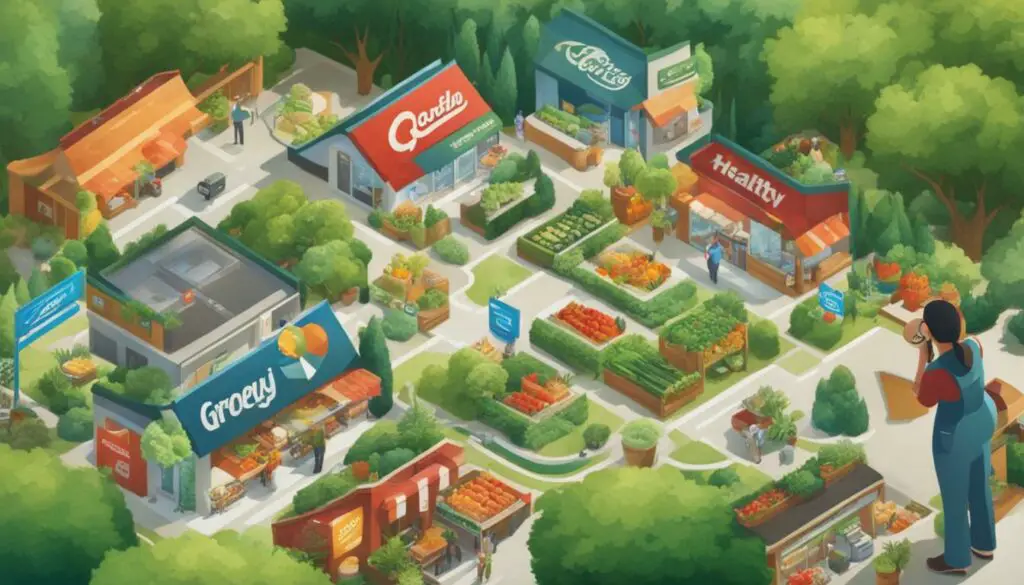
If you’re interested in joining a co-op grocery store, there are resources available to help you find one near you. Websites like Local Harvest offer search tools that allow you to locate local co-ops. It’s important to research and understand the differences between co-ops, as some may require membership while others allow non-members to shop. Consider your own food values, lifestyle, and shopping habits when choosing a co-op that aligns with your needs.
The Future of Co-Op Grocery Stores
The future of co-op grocery stores looks promising as more people recognize the advantages they offer. Co-ops have the potential to continue growing and expanding, providing communities with access to local, sustainable, and high-quality food. As more individuals prioritize community connection and supporting local businesses, co-ops are likely to play an increasingly important role in the grocery industry.
Benefits of Co-Op Growth and Expansion
Co-op growth and expansion have numerous benefits, both for the co-ops themselves and the communities they serve. Here are some key advantages:
“Co-ops allow communities to regain control of their food system and make decisions that align with their values.”
- Increased Access to Local, Sustainable, and High-Quality Food: As co-ops grow and expand, they can establish relationships with more local farmers and producers, ensuring a steady supply of fresh and sustainable food options for their communities. This allows individuals to support local agriculture and enjoy high-quality products.
- Economic Development: Co-op growth stimulates the local economy by creating job opportunities and supporting small businesses. As co-ops expand, they may require additional staff members, contributing to employment opportunities within the community.
- Community Well-being: Co-ops foster a sense of belonging and community connection. As they grow, they can provide more resources for community development initiatives, such as educational programs, food access projects, and partnerships with local organizations.
- Environmental Sustainability: Co-ops are committed to environmentally responsible practices, such as sourcing locally, reducing packaging waste, and supporting sustainable agriculture. With growth and expansion, co-ops can extend their impact in promoting sustainable food systems and reducing carbon footprints.
The future of co-op grocery stores holds promise for communities looking for local and sustainable food options, economic development, and a sense of belonging. As co-op growth and expansion continue, they will continue to play a vital role in supporting local economies, connecting communities, and promoting responsible food practices.
| Benefits of Co-Op Growth and Expansion | Description |
|---|---|
| Increased Access to Local, Sustainable, and High-Quality Food | Co-op growth allows for expanded relationships with local farmers and producers, ensuring a steady supply of fresh and sustainable food options. |
| Economic Development | Co-op growth creates job opportunities and supports small businesses, contributing to the local economy. |
| Community Well-being | Growing co-ops provide more resources for community development initiatives, fostering a sense of belonging and community connection. |
| Environmental Sustainability | Co-ops prioritize environmentally responsible practices, such as local sourcing and reducing packaging waste, contributing to sustainable food systems. |
Conclusion
Co-op grocery stores offer a unique and community-oriented approach to shopping for groceries. As community-owned businesses, co-ops prioritize cooperation, community development, and high-quality, locally sourced products. By joining a co-op, you can enjoy financial rewards, actively participate in the democratic decision-making process, and support the local economy.
Shopping at a co-op grocery store goes beyond just getting access to delicious and healthy food. It allows you to be part of a system that fosters community and social responsibility. Co-ops create a sense of belonging and connection, where you can meet like-minded individuals, form relationships, and contribute to local initiatives.
If you are looking for a grocery shopping experience that aligns with your values, consider joining or visiting a co-op grocery store near you. By supporting co-ops, you are supporting a model that prioritizes community needs, local businesses, and sustainable practices. Experience the many advantages that co-op grocery stores offer and become an active participant in building a stronger, healthier, and more connected community.
FAQ
What is a co-op grocery store?
A co-op grocery store is a unique type of grocery store that is owned and operated by members of the community.
How do co-op grocery stores work?
Co-op grocery stores operate by allowing anyone to shop, eat, and hang out at the store. Individuals can also become co-op owners by purchasing ownership shares.
How do I become a co-op owner?
You can become a co-op owner by purchasing ownership shares. Co-op owners enjoy various benefits, including financial rewards such as discounts and coupons, a vote in choosing the board of directors, and the opportunity to impact the co-op’s future direction.
Why do co-ops matter?
Co-ops matter because they prioritize cooperation and community development. They foster strong relationships between suppliers and consumers and set a standard for environmental and social responsibility within the business community. Co-ops also keep money in the local economy, increase market access for locally produced food, and prioritize practices that are good for people and the planet.
What are the benefits of joining a co-op?
Joining a co-op grocery store comes with several benefits. Co-op owners often receive financial rewards such as discounts, coupons, and a share of the co-op’s profits through patronage dividends. Owners also have a democratic voice in the co-op’s operations and can elect the board of directors and participate in ballot initiatives. Additionally, joining a co-op supports the local economy and strengthens the community by keeping money circulating locally.
What products can I find at a co-op grocery store?
Co-op grocery stores are known for their access to local food and high-quality products. They prioritize sourcing local products and offer a wide range of options for individuals following special diets or managing food sensitivities.
How do co-op grocery stores support local farmers and small businesses?
Co-op grocery stores play a crucial role in supporting local farmers and small businesses by prioritizing sourcing products from local farms. This helps to keep money in the local economy and supports small regional agricultural businesses.
How do co-op grocery stores foster a sense of community?
Co-op grocery stores are owned and operated by members of the community, which creates a gathering place where people can connect and form relationships. Whether it’s chatting with fellow shoppers or participating in community education projects, shopping at a co-op grocery store allows you to be part of something larger than just a commercial exchange.
How can I find a co-op grocery store near me?
There are resources available to help you find a co-op near you. Websites like Local Harvest offer search tools that allow you to locate local co-ops. It’s important to research and understand the differences between co-ops, as some may require membership while others allow non-members to shop. Consider your own food values, lifestyle, and shopping habits when choosing a co-op that aligns with your needs.
What is the future of co-op grocery stores?
The future of co-op grocery stores looks promising as more people recognize the advantages they offer. Co-ops have the potential to continue growing and expanding, providing communities with access to local, sustainable, and high-quality food. As more individuals prioritize community connection and supporting local businesses, co-ops are likely to play an increasingly important role in the grocery industry.
Source Links
- https://www.grocery.coop/food-coops/what-is-a-co-op
- https://www.tasteofhome.com/article/food-co-ops/
- https://www.realsimple.com/food-recipes/shopping-storing/food/what-is-a-food-co-op
See also:


Leave a Reply